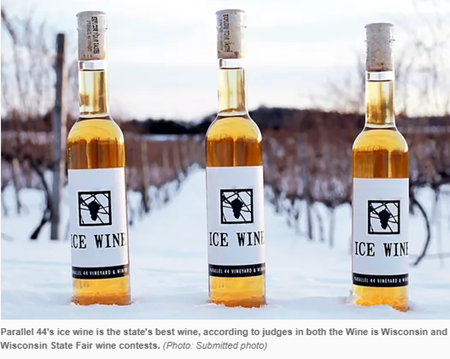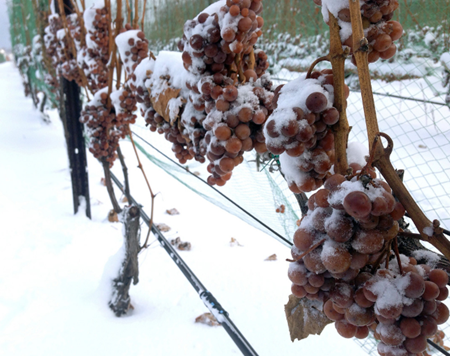Click below to listen to my 2 min. Garden Bite radio show: Cold weather wines turn Icy!
Hardy grapes developed by the University of Minnesota and University of Wisconsin-Madison have been instrumental in the explosion of wineries in the Upper Midwest. In just 8 years, Wisconsin went from 18 wineries to 120! In Minnesota there are 37 wineries. Among them is something very unique, Ice Wine.

Owner and grower at Indian Island Winery, Ray Winter, explained, “You have to leave the grapes till they’re frozen solid in the vineyard. During that time, you have to keep the birds and deer away. It takes two nights down to zero degrees in row,”. His family-run business celebrates its tenth anniversary this year. The flavor, he said, is worth the extra work and so unique – very concentrated. This is from their website:
Indian Island Ice: $49.95 NOW AVAILABLE!Indian Island Ice is a “true” ice wine harvested in mid December with an air temperature of 5 degrees above zero. After 36 hours of pressing the frozen grapes, we ended with juice at a high sugar level of 40 brix. It was fermented to about 12% alcohol and remains with about 19% residual sugar. It is a dessert Ice wine made with the Frontenac Gris grape. It has aromas of peach and apricot and goes great with cheesecake, hard cheeses, and many other foods.

Here’s an article from Midwest Wine Press
And from Wollersheim Winery in Wisconsin
This clearly ain’t California, however, they’ve been doing this in Germany for centuries! This is some really interesting history on Ice Wine from where it started!
These cold hardy wines are winning awards around the country and really competing with the traditional warm weather grapes! Some of the grapes that grow best in this climate are Marquette, Frontenac gris, petite pearl and La Crescent. These cold weather grapes are high in acidity but offer an array of flavors and yield a broad spectrum of wines. Marquette grapes are the most common in the Midwest and are often called the North American cousin to pinot noir. Frontenac grapes are very sweet and are good for port wines. Petite pearl grapes are quite bold and generally combined with Marquette grapes to make cabernet and merlot.
There’s a lot of work growing grapes and a lot of waiting until the vines deliver enough of a crop to really start making a living at it! If you’ve a mind, check out your local state’s wineries and, perhaps think of them for holiday gifts!
